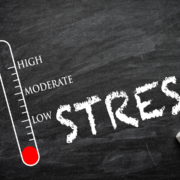The Battle With Stubborn Weight
Do you battle with stubborn weight? Perhaps you have tried a number of different diet plans with some success, but you still hit a wall. So you visited your doctor and were told to eat less and exercise more. I’m sure you have discovered that’s not your answer either.
While calories can influence weight gain or loss, it’s a more intricate system than most realize. There are a variety of hormones that influence the function of your body and the way it uses the food you consume.
Your situation can actually be made worse by stress hormones, and there have certainly been plenty of those at play this past year.
The Effect of Chronic Stress
Chronic stress increases the production of cortisol – the main stress hormone – causing increased blood sugar, increased cholesterol, promoting the accumulation of belly fat and depression. Many of these symptoms are experienced by those with insulin resistance or diabetes.
Too much cortisol can also cause muscle loss and interfere with thyroid function, both of which lower your metabolism. A slower metabolism leads to stubborn weight.
Quality sleep is also important for balanced blood sugar and weight, and too much cortisol negatively impacts sleep. Did you experience that last year? If you are still having trouble sleeping well, you can see that decreasing stress is a vital focus.
You’ve heard it before, right? Stress is a significant threat. We can’t completely eliminate it, but it is important to moderate it. Stress is defined as a real or imagined threat to our body or ego. Your body perceives stress when you feel threatened by an attacker, by a demanding schedule, and more. A body struggling against chronic disease is stressed. In fact, your body may perceive stress when you don’t feel particularly stressed.
The unremitting stress created by your attitude toward stress has dramatic impact on your blood sugar and weight. Pause a minute and think … do you see the world as a safe place or a dangerous one? Do you believe things will work out in the end? If you see the glass half empty, taking steps to calm your stress would benefit you, whether you are trying to lose weight or not.
Cool The Fire
Here are some ways you can reduce your body’s stress response. Daily focus on this is important.
Eat whole foods that decrease the stress response. These could include Brazil nuts, fatty fish, eggs, matcha, pumpkin seeds and dark chocolate (yes, you knew this would help).
Make choices that bring balance – practice saying “no” to others and “yes” to yourself. Prioritizing brief down-times during the day to relax will enable you to function better.
Breathe! Take a moment several times in the day to pause and breathe, slowly and deeply.
Explore yoga or meditation. Yoga can be effective in a physical class or by video or app. And there are numerous meditation apps to guide you with studies demonstrating that 2 minutes a day can make a difference.
Take a walk outside. Exercise prompts your body to release endorphins which reduces the pressure of stress.
Give yourself the gift of prioritizing stress relief. A little time each day for activating the relaxation response with any of these approaches can transform deep-seated symptoms that show up as the battle with stubborn weight, chronic disease or altered mood.










